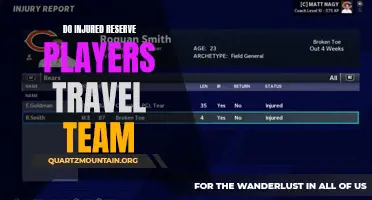
Choosing the right travel team can be a game-changer for young athletes looking to excel in their sport. Whether it's soccer, basketball, or any other competitive field, finding the perfect team can provide the necessary opportunities and support for growth and success. However, there may come a time when the current team no longer fits the athlete's needs, and it becomes crucial to recognize the signs that it's time for a change. In this article, we will explore some key indicators that athletes should consider when deciding to switch travel teams, ensuring they continue on the path towards reaching their full potential.
| Characteristics | Values |
|---|---|
| Skill level | Higher skill level opportunities |
| Coaching staff | Experienced and knowledgeable coaches |
| Team dynamics | Positive and supportive team environment |
| Player development | Structured and effective player development program |
| Competitive level | Opportunities to compete against strong teams |
| Playing time | Fair and equal playing time |
| Travel and expenses | Reasonable travel schedule and affordable expenses |
| Team philosophy | Alignment with personal goals and values |
| Tournament schedule | Access to high-quality tournaments |
| Communication | Clear and effective communication between coaches and players/parents |
| College exposure | Opportunities for college scouts to see you play |
What You'll Learn

Evaluating the Team's Competitive Level
Evaluating the competitive level of a travel team is an essential step in determining when to switch teams. It is important to regularly assess whether the team is providing the right level of competition to support the growth and development of the player. Here are some key factors to consider when evaluating the team's competitive level:
- Assess the team's performance: Observe how the team performs in tournaments and matches against other teams. Look at their win-loss record, the level of competition they face, and how they fare against strong opponents. This will give you a good idea of the team's current level.
- Evaluate individual player development: Consider whether the team is providing enough challenge and opportunities for individual player development. Look at how players are progressing in their skills and if they are being pushed to improve. If players are consistently outperforming their teammates or not being challenged enough, it may be a sign that the team's competitive level is not suitable.
- Gauge the level of competition in the league: Research the level of competition in the league or divisions the team is playing in. Evaluate if the league provides the desired level of competition for the player. If the team is consistently dominating the league or not facing strong competition, it may be time to consider a switch.
- Seek feedback from coaches and teammates: Talk to the coaches and teammates to get their perspective on the team's competitive level. Coaches can provide valuable insights about the team's goals and potential for improvement. Teammates can also offer their opinions on the team's strengths and weaknesses. Consider their feedback along with your own observations.
- Consider long-term goals: Evaluate how the team aligns with the player's long-term goals. If the player aspires to play at a higher level or join a more competitive team in the future, it may be beneficial to switch to a team that provides the necessary challenges and opportunities for growth.
- Explore other team options: Research and explore other travel team options that offer a higher level of competition. This may involve attending tryouts, reaching out to other teams, or seeking recommendations from coaches and fellow players. Keep an open mind and explore different possibilities to find the best fit for the player.
- Timing and transition: Consider the timing of the switch and how it will impact the player's development and integration into the new team. If possible, try to make the switch at the end of a season or during a natural transition point in the player's development. It's important to smoothly transition into the new team and ensure it provides the desired level of competition.
Switching travel teams is a big decision that should be carefully evaluated. By assessing the team's competitive level and considering these key factors, you can make an informed decision that will support the player's growth and development. Remember, it's important to prioritize the player's long-term goals and find a team that provides the necessary challenges and opportunities for success.
The Growing Number of Indians Traveling to China: A Trend to Watch
You may want to see also

Considering the Team's Training and Development Opportunities
When considering whether to switch travel teams, one important factor to consider is the training and development opportunities offered by each team. This can be a crucial aspect in determining whether you will be able to reach your full potential as a player.
First and foremost, it’s important to evaluate the quality of coaching on each team. The coaches should be experienced, knowledgeable, and dedicated to helping their players improve. Look for teams that have a track record of developing players who have gone on to achieve success at higher levels of play. Ask about the coaches' qualifications and their coaching philosophy to ensure that they align with your goals and aspirations as a player.
In addition to the quality of coaching, consider the team’s training facilities and resources. A team with access to top-notch training facilities will provide a more conducive environment for skill development. Look for teams that have access to well-maintained fields, strength and conditioning facilities, and other resources that can help you improve your game. These resources can play a significant role in your development as a player.
Furthermore, consider the team’s training schedule and frequency. Look for teams that offer regular training sessions and a comprehensive training program. Consistency is key in skill development, so it’s important to choose a team that provides ample opportunities to practice and improve your skills.
Another important aspect to consider is the level of competition within the team. Opting for a team that offers a higher level of competition can push you to elevate your game and improve more quickly. Playing against more skilled opponents can expose you to new challenges and force you to raise your performance to keep up. However, it’s important to strike a balance and ensure that the competition level is appropriate for your skill level and development stage.
Lastly, consider the team’s focus on player development and individual attention. Look for teams that prioritize individual player growth and have a structured development program in place. This may include individualized training plans, player evaluations, and regular feedback sessions. A team that invests in your development as a player is more likely to provide you with the tools and opportunities to reach your full potential.
In conclusion, when considering whether to switch travel teams, carefully evaluate the training and development opportunities offered by each team. Look for quality coaching, access to top-notch facilities, a comprehensive training program, the right level of competition, and a focus on individual player development. By considering these factors, you can make an informed decision that will give you the best chance to grow and thrive as a player.
Exploring the Cosmos: How We Could Travel to Another Solar System
You may want to see also

Assessing the Travel Team's Schedule and Commitments
Assessing the Travel Teams Schedule and Commitments
Joining a travel team can be an exciting opportunity for young athletes to take their skills to the next level. However, as they progress and gain experience, it's important to assess the team's schedule and commitments to ensure it aligns with their goals and aspirations. Making the decision to switch travel teams can be a tough one, but evaluating these factors can help athletes and their parents make an informed decision.
- Level of Competition: One of the primary reasons athletes join travel teams is to face higher levels of competition. Take a close look at the teams in the league or tournaments your current travel team participates in. Are they consistently playing against teams that challenge and push the athletes to improve? If the level of competition is not up to par, it might be time to consider switching to a team that provides more competitive opportunities.
- Training and Practice Schedule: Travel teams often have rigorous training and practice schedules. Evaluate the frequency and intensity of the practices. Are the players getting enough time on the field to develop their skills and improve their performance? Additionally, consider if the practice times and locations are convenient for both the athlete and their family. If the schedule is too demanding or conflicting with other commitments, it may be necessary to find a team with a more manageable practice schedule.
- Traveling Requirements: Travel teams are called so because they often require players to travel to different locations for games and tournaments. Assess the travel expectations of your current team. How frequently are you required to travel? Will the distances and costs associated with travel become burdensome for your family? Consider the impact of travel on schoolwork, family time, and other activities. If the travel demands are becoming too overwhelming, it may be worth exploring alternatives.
- Coaching and Development: Evaluate the coaching staff on your current team. Are they experienced and knowledgeable about the sport? Do they provide meaningful feedback and actively work on improving the players' skills? Coaches play a vital role in an athlete's development, so if you feel that the coaching staff is not able to meet your expectations or help you reach your full potential, it might be time to seek a team with better coaching resources.
- Team Atmosphere and Dynamics: Playing on a travel team is not just about the sport; it's also about being part of a team. Assess the overall atmosphere and dynamics of your current team. Do you feel a sense of camaraderie and support from your teammates? Are there any conflicts or issues that make it difficult for you to enjoy playing the sport? If the team dynamics are negatively impacting your experience, it might be beneficial to consider switching to a team with a more positive and supportive environment.
- College Exposure Opportunities: For athletes aspiring for collegiate sports, exposure to college coaches is crucial. Evaluate the track record of your current travel team in this regard. Have they successfully helped players get noticed by college recruiters? If your current team is not providing sufficient opportunities for exposure, it might be worth exploring other teams with better connections and resources for college recruitment.
Switching travel teams is a significant decision that should be made after careful consideration and thorough evaluation. Assessing the team's schedule and commitments, along with other important factors, can help young athletes and their parents make an informed choice that aligns with their goals and aspirations. Remember, finding the right team can greatly contribute to an athlete's growth, development, and overall enjoyment of the sport.
The Best Ways to Travel from London to Brighton
You may want to see also

Reflecting on the Player's Own Goals and Aspirations
Deciding when to switch travel teams is a significant decision for any young athlete. It's a decision that requires careful consideration and reflection on their own goals and aspirations. Here are some key factors that players should reflect on when making this decision:
- Performance opportunities: Reflect on the level of competition offered by your current travel team. Are you consistently challenged by the opponents you face? Do you feel like you have reached your potential in your current team? Switching to a higher-level team can provide more opportunities to compete against stronger opponents and improve your skills.
- Skill development: Evaluate the training and coaching provided by your current travel team. Are you getting the technical instruction and guidance you need to improve your skills? If you feel like you have reached a plateau in your development, it might be time to consider switching to a team that offers more advanced training programs.
- Playing time: Reflect on the amount of playing time you are getting on your current team. If you consistently find yourself on the bench or in a limited role, it might be beneficial to look for a team where you can get more playing time. Playing regularly will not only enhance your skills but also boost your confidence and enjoyment of the game.
- Team culture and values: Consider the overall team culture and values of your current travel team. Do you feel a sense of belonging and camaraderie with your teammates? Are the team goals and values aligned with your own goals and values? Switching to a team with a better fit in terms of culture and values can create a more positive and fulfilling playing experience.
- College prospects: If your ultimate goal is to play at the college level, reflect on the college exposure provided by your current team. Are college coaches regularly attending your games and tournaments? Do you have access to college recruiting resources and guidance? Switching to a team with a stronger college recruiting network can increase your chances of getting noticed by college coaches.
- Financial considerations: While it's essential to prioritize your goals and aspirations, it's also necessary to consider the financial implications of switching travel teams. Evaluate the costs associated with joining a new team, such as registration fees, travel expenses, and additional training fees. Make sure you and your family have a realistic understanding of the financial commitment required.
Remember, switching travel teams is a personal decision, and there is no one-size-fits-all answer. It's important to take the time to reflect on your own goals and aspirations carefully. Consider discussing your thoughts with your current coach, parents, and trusted mentors who can provide guidance and support in making this decision. Ultimately, choosing a travel team that aligns with your goals and aspirations can have a significant impact on your growth and development as a player.
Exploring the Boundless Opportunities: Traveling to China Anytime with a 10-Year Visa
You may want to see also
Frequently asked questions
The right time to switch travel teams can vary depending on the individual player and their specific circumstances. It might be a good idea to switch travel teams if you are not getting enough playing time or if you are not happy with the coaching staff. Additionally, if you feel that your skills have outgrown your current team or if you have potential opportunities for growth and development on another team, it might be the right time to make a switch.
One way to determine if it's time to switch travel teams is to honestly assess your goals and aspirations as a player. If your current team is not helping you achieve those goals or if you are finding it difficult to progress and improve, it might be time to explore other options. It is also important to consider if you are being pushed to your full potential and if you are enjoying the experience with your current team.
While switching travel teams can offer new opportunities and benefits, there can also be some drawbacks. It might take time to adjust to a new team dynamic and coaching style. Additionally, you might lose connections and friendships that you have built with your current teammates. It is important to weigh the potential benefits against any potential drawbacks before making a decision.
Before switching travel teams, it is important to communicate your concerns or desires with your current coach and teammates. They might be able to address any issues or offer solutions that could help you stay with the team. If you do decide to switch, it is important to approach the process professionally and respectfully. Contact the coach of the new team, express your interest, and see if there is an opportunity to try out or join the team. Additionally, make sure to research and evaluate the new team to ensure it aligns with your goals and expectations.







